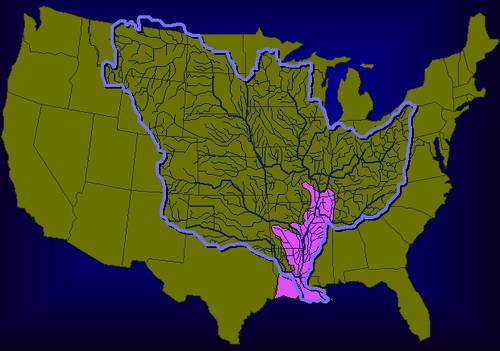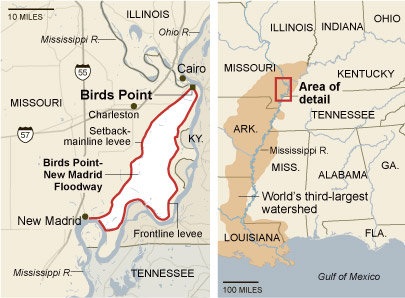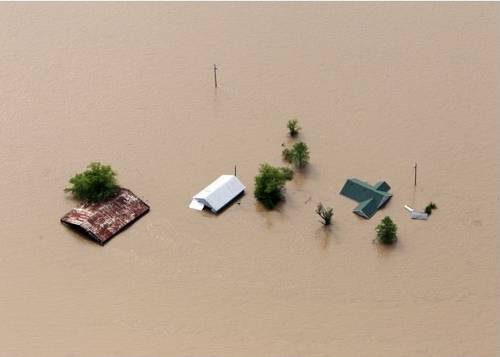U.S. Government is Flooding Farmland; Farmers May Never Be Able to Recoup the Losses
The U.S. Government is Flooding Farmland to Save the Cities
The U.S. Army Corps of Engineers intentionally breached the levee at Birds Point, resulting in the flooding of thousands of acres of Missouri prime farmland as well as damage and destruction to homes and buildings. "Farmers in the affected area will not only lose this year's crop, but have a long-term cleanup and restoration project if they hope to return their land to production, and we fear much of the flooded land might never be able to recover to its prior productivity," Hurst said. "Farm Bureau will do everything possible to ensure the farmers are compensated and receive all the help available to restore their farmland to productivity. It is vital the government rebuilds the levee as soon as possible, and cuts through red tape to get the compensation and help to those affected by this disaster immediately." - Farm Bureau seeks compensation for flooded farmland, May 22, 2011, 2011
Associated Press - In an agonizing trade-off, Army engineers said they will open a key spillway along the bulging Mississippi River as early as today and inundate thousands of homes and farms in Louisiana’s Cajun country to avert a potentially bigger disaster in Baton Rouge and New Orleans.
About 25,000 people and 11,000 structures could be in harm’s way when the gates on the Morganza spillway are unlocked for the first time in 38 years.
Opening the spillway will release a torrent that could submerge about 3,000 square miles under as much as 25 feet of water but take the pressure off the downstream levees protecting New Orleans, Baton Rouge and the numerous oil refineries and chemical plants along the lower reaches of the Mississippi.
Engineers feared that weeks of pressure on the levees could cause them to fail, swamping New Orleans under as much as 20 feet of water in a disaster that would have been much worse than Hurricane Katrina in 2005.
Instead, the water will flow 20 miles south into the Atchafalaya River. From there it will roll on to the Gulf of Mexico, flooding swamps and croplands. Morgan City, an oil-and-seafood hub and a community of 12,000, shored up levees as a precaution.
The corps said it will open the gates when the river’s flow rate reaches a certain point, expected Saturday. But some people living in the threatened stretch of countryside — an area known for small farms, fish camps and a drawling French dialect — have already started fleeing for higher ground.
Sheriffs and National Guardsmen will warn people in a door-to-door sweep through the area, Gov. Bobby Jindal said. Shelters are ready to accept up to 4,800 evacuees, the governor said.
“Now’s the time to evacuate,” Jindal said. “Now’s the time for our people to execute their plans. That water’s coming.”
The Army Corps of Engineers employed a similar cities-first strategy earlier this month when it blew up a levee in Missouri — inundating an estimated 200 square miles of farmland and damaging or destroying about 100 homes — to take the pressure off the levees protecting the town of Cairo, Ill., population 2,800.
Army Engineers Flood 130,000 Acres of Missouri Farmland to Save Blighted Illinois Town of 2,800
May 2, 2011
Reuters - A federal judge on Friday ruled that the U.S. Army Corps of Engineers can blow up a Mississippi River levee, which would flood Missouri farmland but prevent the flooding of an Illinois town.
NYTimes May 2nd update: Missouri has appealed to the US Supreme Court, while at this moment, explosives are being packed.
May 3rd update below. The levee was exploded and farmland flooded.
U.S. District Judge Stephen N. Limbaugh Jr. [appointed by Bush in 2008 and related to Rush Limbaugh] ruled that the Corps had the right to breach the levee to prevent flooding in Cairo, Illinois, as permitted by a 1928 law.
The levee breach could flood 130,000 acres of Missouri farmland, which contains about 90 homes. Missouri had filed suit to prevent the Corps from carrying out its plan.
Limbaugh wrote that he found that the Corps is committed to implementing the plan only as essential to provide protection to all citizens. He wrote,
“This Court finds that no aspect of the Corps’ response to these historic floods suggests arbitrary or capricious decision-making is occurring.”
The Corps plans to decide this weekend whether to blow up the Birds Point levee, depending on the level of water in the river. It will detonate explosives in the levee if the Cairo river reaches 61 feet. At 8 a.m. local time on Friday, it was at 59 feet and was forecast to rise to 60.5 feet, according to the National Weather Service.
Missouri plans to appeal the judge’s decision. But the approximately 200 Missouri state residents who would be in the path of the flood if the levee is detonated have already been evacuated.
Cairo, an historic town of 2,800 people, is at the confluence of the Ohio and Mississippi rivers. Both rivers have been rising to historic levels as a result of days of rain and the melt and runoff of the winter’s heavy snow storms.
Both neighboring states of Illinois and Kentucky had protested Missouri’s suit. Kentucky has argued that more than $32 million in damage could be suffered in Fulton County alone if the water got too high and the Birds Point levee was not intentionally breached.
James Wilson, the former mayor of Cairo and spokesman for current Mayor Judson Childs, said they are both “very pleased” with the judge’s decision.
“We hope to God it doesn’t have to be done,” said Wilson of the proposed levee breach. “But we feel more secure in Cairo knowing if the river reaches a certain potential level they would take the action to ease the situation in Cairo and around us.”
Wilson said that up to 600 people had already voluntarily evacuated the town, and that Childs is “strongly” recommending Friday that senior citizens, anyone with medical conditions, and families with young children in single-story homes should leave in the next 24 hours. Flooding is already a problem in town, and people are sandbagging around their homes.
“It’s getting kind of deserted,” said Wilson. “It’s an eerie feeling.”
Illinois Attorney General Lisa Madigan applauded the decision, noting that if the river gets too high and Birds Point is not blown up, water in Cairo could reach up to 20 feet, topping a two-story house. Cairo is over 60 percent African-American and the income of a third of its residents is below the poverty level, Wilson said. Alexander County, which includes Cairo, has a median income of $26,042.
Corps Division Commander Vernie Reichling said Friday that the Corps is still in a “holding pattern” while it watches the river and the weather.
More heavy rainfall is possible in the Cairo area on Saturday night into early next week, with up to four inches by Tuesday night, according to the National Weather Service.
Meanwhile, flooding conditions were easing farther up the Ohio River in Louisville, Kentucky. The river started receding and is expected to fall below flood stage early next week.
Mike Callahan, a hydrologist with NWS, said how quickly the river drops depends on the amount of rain that falls over the next four days. Callahan stressed that more rain than predicted could slow things down and that residents displaced from their homes should wait and see what happens.
Water rises around a farm in the Birds Point-New Madrid floodway after the U.S. Army Corps of Engineers created a breach in the levee with explosives on Monday night. David Carson dcarson@post-dispatch.com
Supreme Court Doesn’t Stop Levee Break that Would Flood Farmland, Save Town
May 2, 2011
ABA Journal - Justice Samuel A. Alito Jr. refused to issue an order Sunday evening blocking U.S. officials from breaking a levee in an effort to save a small Illinois town.
Missouri Attorney General Chris Koster had asked the U.S. Supreme Court to stop the break, which will flood 130,000 acres of farmland in his state to avoid flooding in Cairo, Ill. The Associated Press, Bloomberg and the New York Times have stories. The Mississippi and Ohio rivers are at their highest levels since 1937. They merge near Cairo, a town of about 3,000 residents that has already been evacuated because of the flood threat.
Flooding the farmland, which includes about 100 homes, will cause about $314 million in damage, compared to $1.7 billion in damage if the levee breaks or overflows in other areas, Bloomberg says.
One Saturday, the St. Louis-based 8th U.S. Circuit Court of Appeals allowed the Army Corps of Engineers to proceed with its plans.
U.S. District Judge Stephen Limbaugh Jr. had refused to issue a temporary restraining order on Friday, citing an 8th Circuit ruling issued in 1984 finding that Congress gave the Corps broad discretion in flood control decisions, the Associated Press reported in a story at the time. He also questioned whether farmers had given the Corps easements to their property that permitted the flooding, according to another Associated Press story.






No comments:
Post a Comment